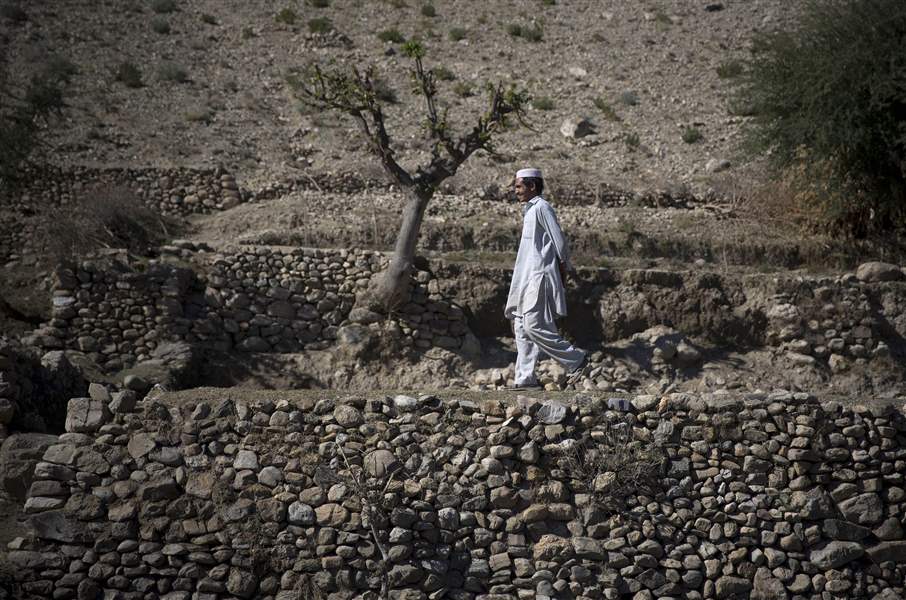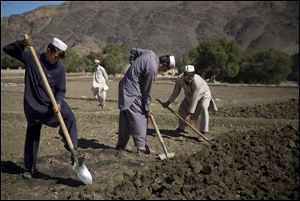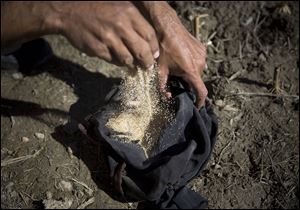
Afghans plant new poppy crop after biggest ever harvest in blow to efforts against opium
11/13/2013
In this Tuesday, Nov. 12, 2013 photo, a poppy farmer makes his way down to the fields across a narrow stream in Cham Kalai village in Afghanistan's eastern Nangarhar province, an area which is largely controlled by Taliban. It is in rural Afghanistan, in villages like Cham Kalai, where the insurgency is the strongest and security is the weakest, that nearly 90 percent of all poppies are grown, says a 2103 drug survey released Nov. 13, 2013 by the UN’s drug control agency. Planting season, which began in Afghanistan in October will end at the end of November. (AP Photo/Anja Niedringhaus)
ASSOCIATED PRESS

In this Tuesday, Nov. 12, 2013 photo, Afghan poppy farmers prepare the soil for their poppy seeds in fields in Cham Kalai village in Afghanistan's eastern Nangarhar province, a Taliban stronghold. Poppy cultivation in Nangarhar province, where Cham Kaai is located, jumped 400 percent in 2013. (AP Photo/Anja Niedringhaus)
CHAM KALAI, Afghanistan — The seeds flew from his hands into the soil. Wrapped in a woolen shawl against the cold, Khan Bacha sowed his fields with the only crop he says brings him enough money to pay his bills and feed his family: Poppies.
Afghanistan’s farmers are rushing to replant their fields with the base ingredient of opium after the country reaped its biggest poppy harvest ever last May. That harvest produced a staggering 5,500 metric tons (6,000 tons) of opium, 49 percent higher than the previous year and more than the combined output of the rest of the world, according to a report issued Wednesday by the United Nations’ drug control agency.
Bacha’s village, Cham Kalai, is in the eastern province of Nangarhar, which saw a dramatic five-fold increase in the area planted with poppies from 2012-2013, the country’s biggest increase. The province also illustrates all the factors fueling the increase and thwarting efforts by Afghan officials and their U.S. allies to eradicate the crop. Poverty is widespread, making the lucrative poppy crop a draw. Instability is high, making any attempt to control planting impossible.
In Bacha’s village of traditional sun-baked mud houses, there’s no electricity, no running water. There isn’t a health clinic for miles. Schools for girls are shunned as against Islam.
“People are poor, families are big. Wheat is no good,” Bacha said. “The only thing that is good is poppies. They are gold.”
The area is also a stronghold for Taliban insurgents. Talk of security in the area just makes Bacha smile. Squatting on the edge of his small plot of land, he gestures off in the distance where he said that just the night before the Taliban fought a fierce battle with Afghan troops backed by “foreign soldiers” — his reference to NATO troops.
Soon after the Associated Press arrived in Cham Kalai earlier this week, climbing down to the fields across a narrow stream, the whispering among the village children began — “Taliban, Taliban,” signaling that fighters were nearby. At first, Bacha looked worried but did not flinch. Then the whispers became louder. Bacha’s glances toward the nearby ridges seemed to pick up something, and his worry turned to panic.
“Go. Go. Now,” he said. The AP team left the area.
The poppy planting season in Afghanistan began last month and lasts until the end of November. Last season, which ended with the May harvest, brought a number of grim milestones: Not only was production the highest level ever, more land than ever before was cultivated with poppies — some 209,000 hectares (516,000 acres), 36 percent more than the previous season, according to the 2013 drug survey by the U.N. Office of Drug and Crime. The amount of poppy crop eradicated by authorities went down 24 percent, to 7,348 hectares (18,000 acres).
Cultivation spread to two provinces that had been declared poppy-free. The vast majority of cultivation — 89 percent — took place in nine provinces that are among the most insecure areas in the country, the report said. The biggest producers are Helmand province, where the Taliban insurgency is strong, and Kandahar province, the birthplace of the Taliban.
That is bad news for Afghanistan, which has a burgeoning addiction problem, and for Europe, the main recipient of Afghanistan’s harvest, said Jean- Luc Lemahieu, the UNODC’s regional representative in Kabul.
More than 1 million Afghans are addicts, living in squalor in its cities. In the capital Kabul they sleep on the street, in a garbage-filled dried river bed reeking of human waste. The U.N. report said Afghanistan has increased its services to treat addicts, but caregivers say they are overwhelmed. Fifteen percent of the 1 million addicts are women, often drawn in by an addicted husband, or children, who are sometimes sent by their parents to find opium to feed their habit and in turn become addicts.

In this Tuesday, Nov. 12, 2013 photo, handfuls of poppy seeds fly through Afghan poppy farmer Khan Bacha's hands as he sows his poppy fields in Cham Kalai village in Afghanistan's eastern Nangarhar province, a Taliban stronghold. Despite 12 years of trying to wean farmers of poppy growing, in 2013 they grew more poppies then ever before. (AP Photo/Anja Niedringhaus)
In an interview in Kabul, a frustrated Lemahieu said the international community spent billions of dollars of development money on roads and irrigation projects without getting Afghans to stop growing poppies.
They were more interested in winning “hearts and minds,” he said. As a result, they were effectively saying, “Love us. We are your protectors here. We are here to help you, and at the same time you plant your opium and I will look in the other direction,” said Lemahieu.
Afghanistan’s deputy counter-narcotics minister, Haroon Rashid Sherzad, said neither the government nor the international community has addressed the poverty and lack of services that he called the “root causes” of the relentless poppy production. He also said consumer nations have to take some responsibility rather “than always blaming Afghanistan.”
Moreover, U.S. and NATO troops partnered with Afghan security contractors and government officials who were involved in the drug trade, said Lemahieu.
“Everybody who is powerful” benefits from the opium industry, he said. “They can be found on (both) sides of the equation, be they insurgents or the local powerbrokers sitting within Parliament, sitting within district councils or sitting within provincial councils.”
Bacha, the farmer, said the Taliban make their money by charging farmers a “religious tax” of one kilogram (2.2 pounds) of opium for every 10 kilograms (22 pounds) produced — though the price is “negotiable.”
“They say we are going for jihad,” he said. “It is the money we give for God.”
Ironically, Taliban leader Mullah Mohammed Omar successfully banned poppy planting in 2000 when the group ruled Afghanistan, according to the UN at the time. Poppy production went from more than 4,000 tons to barely a few pounds, the UN said.
When the Taliban were ousted in December 2001, farmers ripped up their wheat — which they said often rotted in the field because there were so few roads to get it to market — and planted poppies.
“Mullah Omar’s decree was a decree but (Afghan President) Hamid Karzai’s decrees are nothing,” said Bacha. Now, he says there’s no danger of the government destroying poppy crops so “the farmers are relaxed.”
Like last season, Bacha is planting his entire small plot of land with poppies. Last season, he earned around $1,200 — well above the country’s average income of around $800 a year.
His neighbor, Waliullah, is also busily sowing his meager piece of land with poppies.
“Our children are planting poppies,” he said. “Even my wife and my mother are planting so we can finish by the end of the month,” he added, pointing to two women hidden in all-enveloping burqas in a nearby field.
Waliullah, who like some Afghans goes by only one name, says his land’s earnings have to feed his extended family of 17 people. “What happened to all the international money? We have no electricity,” he said.
Bacha said local residents don’t worry about a resurgence of Taliban.
“Nobody cares about tomorrow,” he said. “Everyone only cares about today.”